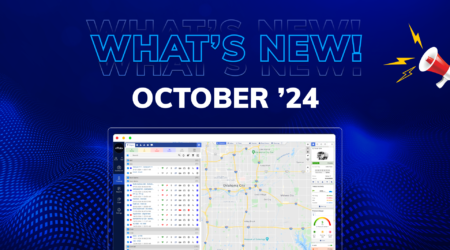What is Vehicle Fleet Tracking System?
Categorized as Blog Fleet Management
In the fast-paced world of fleet management, efficiency and cost reduction are not just goals—they’re necessities for survival and growth. Fleet managers often grapple with challenges such as optimizing route planning, reducing fuel consumption, ensuring driver safety, and maintaining regulatory compliance. Amidst these challenges, technology offers a beacon of hope. A vehicle fleet tracking system, integrated with advanced fleet management software, emerges as a pivotal tool, providing real-time data and analytics to streamline operations, enhance safety, and improve customer satisfaction.
The adoption of such technology not only promises significant cost savings but also propels fleets towards operational excellence. With the right vehicle fleet tracking system, fleets can overcome traditional barriers to efficiency, leveraging data to make informed decisions that bolster productivity and profitability.
I’ll continue with the subsequent sections in the following responses, focusing on maintaining the content’s uniqueness, clarity, and relevance to the target audience while incorporating SEO best practices.
Continuing from the introduction, let’s delve into the importance of fleet efficiency and cost management, highlighting how a vehicle fleet tracking system becomes indispensable in achieving these objectives.
A vehicle fleet tracking system is a technological solution used by companies or organizations to monitor and manage their fleet of vehicles in real-time. These systems utilize GPS (Global Positioning System) and cellular or satellite communication technology to track the location, movement, speed, and other parameters of vehicles in the fleet.
Key features of a vehicle fleet tracking system includes:
Fleet efficiency isn’t just about getting from point A to point B. It’s a comprehensive measure that includes optimizing route planning, ensuring vehicles are well-maintained, reducing idle times, and improving the overall productivity of the fleet. Efficient fleets are able to serve more customers, reduce operational costs, and increase profitability. In essence, fleet efficiency directly impacts a company’s bottom line and its ability to compete in a crowded marketplace.
Cost management, on the other hand, is about more than just slashing expenses—it’s about strategic spending that maximizes ROI. This includes investing in technologies that reduce fuel consumption, enhance vehicle longevity, and minimize repair costs. It also involves managing insurance costs and ensuring compliance to avoid fines. Effective cost management not only reduces expenses but also stabilizes operations, making the business more resilient to market fluctuations.
A vehicle fleet tracking system plays a crucial role in both enhancing fleet efficiency and managing costs. By providing real-time data on vehicle location, speed, fuel usage, and driver behavior, fleet managers can make informed decisions that lead to significant savings and operational improvements.
Vehicle fleet tracking systems utilize GPS technology to monitor the location and movement of vehicles in real-time. This data is transmitted to a central system, often integrated with advanced fleet management software, allowing managers to view the status of their fleet at a glance. The system can alert managers to issues such as unauthorized vehicle use, deviations from planned routes, and potential maintenance needs.
The heart of a vehicle fleet tracking system lies in GPS technology, telematics, and cloud-based data analytics. These components work together to provide a comprehensive view of fleet operations, offering insights that were previously unattainable.
The true power of a vehicle fleet tracking system lies in its ability to facilitate data-driven decision-making. By analyzing trends in fuel usage, vehicle wear and tear, and driver behavior, fleet managers can identify areas for improvement, optimize routes, and implement training programs to enhance driver efficiency.
Implementing a vehicle fleet tracking system offers a multitude of benefits, each contributing to reduced operational costs and improved efficiency.
One of the most immediate benefits of a fleet tracking system is the reduction in operational costs. By optimizing routes, fleets can reduce fuel consumption and save on maintenance costs by preventing excessive wear and tear. Additionally, insights into driver behavior can lead to lower insurance premiums through improved safety records.
Route optimization also plays a significant role in enhancing fleet efficiency. By avoiding traffic congestion and taking the most efficient routes, delivery times can be reduced, and customer satisfaction can be significantly improved. Furthermore, real-time tracking allows for better vehicle utilization, ensuring that each vehicle is fully utilized, reducing the need for an oversized fleet.
A vehicle fleet tracking system also improves safety and compliance. Monitoring driver behavior can identify risky practices such as speeding or harsh braking, allowing for targeted driver training. Compliance with regulatory requirements can also be ensured through features such as electronic logging devices (ELDs) for hours of service (HOS) tracking.
Finally, real-time updates provided by a tracking system can significantly enhance customer satisfaction. Customers appreciate accurate delivery times and the ability to track their orders in real-time, leading to a better overall service experience.
Selecting the right vehicle fleet tracking system for your business is crucial for maximizing the benefits of this technology. Here are key considerations to guide your decision:
Key Features and Capabilities
It should easily integrate with your existing software systems, such as inventory management and customer relationship management (CRM) tools, to streamline operations and data analysis. The ability to add more vehicles or integrate advanced features without significant overhauls is crucial for long-term utility.
Integrating your vehicle fleet tracking system with advanced fleet management software can unlock additional efficiencies and cost savings. This software can automate many of the tasks involved in fleet management, from scheduling maintenance to optimizing routes based on real-time traffic data. It also provides a centralized platform for monitoring all aspects of your fleet’s operations, making it easier to make informed decisions that enhance profitability and service quality.
In today’s competitive business environment, efficiency and cost management are more important than ever for fleet operations. A vehicle fleet tracking system, especially when integrated with advanced fleet management software, offers a powerful solution to these challenges. By providing real-time data and insights into every aspect of fleet operations, these systems enable businesses to reduce operational costs, enhance efficiency, improve safety and compliance, and increase customer satisfaction.
Whether you’re managing a small delivery fleet or a large logistics operation, the right vehicle fleet tracking system can provide the tools you need to optimize your operations. By carefully selecting a system that fits your business needs and leveraging its full range of features, you can transform your fleet into a streamlined, cost-effective operation that is poised for success in the dynamic world of transportation and logistics.
Remember, the journey to enhanced fleet efficiency and reduced operational costs begins with the adoption of the right technology. Consider how a vehicle fleet tracking system can fit into your business strategy and take the first step towards optimizing your fleet’s potential today.




